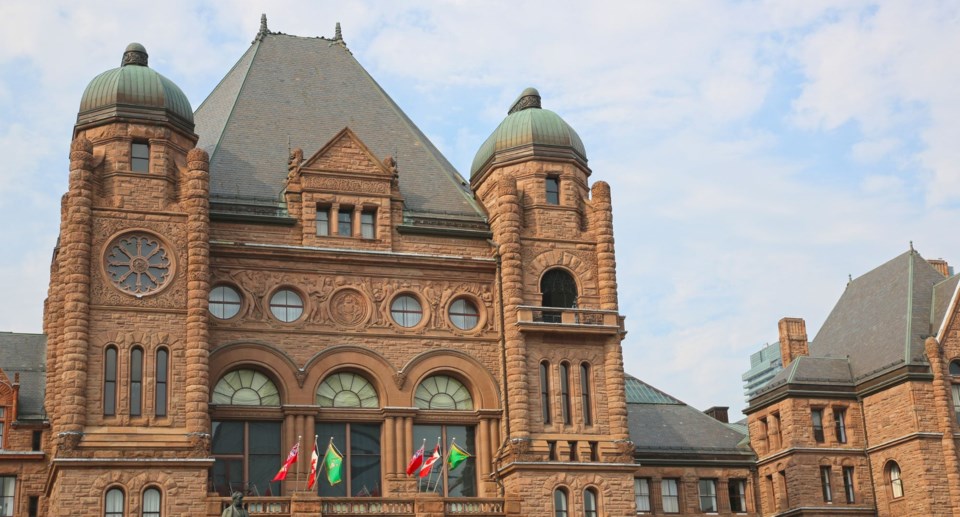EDITOR’S NOTE: This article originally appeared on The Trillium, a new Village Media website devoted exclusively to covering provincial politics at Queen’s Park.
Nickel Belt MPP France Gélinas told a short story at Queen's Park this week about the time she asked a room full of seniors to let her know if their doctor had ever charged them for health care.
The punch line? One-hundred-forty-two people lined up and told her all about having to pay for cataract surgery. The NDP MPP is her party's longtime health critic and a staunch opponent of the Ontario government's plan to allow more private clinics to deliver more surgeries in Ontario.
She told the story Monday at a legislative committee studying an auditor general's report that had raised concerns about patients being subject to misleading sales practices by ophthalmologists who convince patients to pay for upgraded lenses and extra eye testing to make a profit.
"They had no idea why they had to pay," she said of the people who lined up to speak with her at a recent seniors' health fair. "They love their doctor, and say, 'He's really, really good. He really did a very, very nice job, and I really, really liked him. But is there a program that would help me pay?"
Some of the seniors told her they believed that if they didn't agree to pay hundreds or thousands of dollars in fees associated with their cataract surgery, which they couldn't easily afford, they would have their driver's licence taken away on the spot.
"In my neck of the woods, there's no public transportation, you need to drive," said the northern MPP.
Gélinas was illustrating her concerns about Bill 60, the Your Health Act, which, if passed will allow the government to license private surgical centres run by for-profit, or not-for-profit entities. She argued it doesn't do enough to protect patients from being pressured into paying add-ons to services insured by OHIP.
That is already a problem with cataract surgeries, according to Gélinas and the auditor general. It is legal in Ontario for ophthalmologists to sell patients upgraded lenses that, like the insured lenses, are used in the surgery to remove cataracts but also correct the patient's vision, as well as for additional testing for those lenses.
However, all patients with cataracts can get standard lenses covered by OHIP, at no cost to them, and cannot be denied cataract surgery for refusing to pay.
The auditor wrote in her report that the province doesn't proactively monitor the practices of surgeons and clinics to confirm that patients are being adequately informed about their right to receive a fully covered surgery without the need to pay out of pocket, and instead relies on patients to make complaints.
Gélinas told the committee that's a problem — the seniors who spoke to her didn't know that they should have been given a free option in the first place and wouldn't dream of complaining about the doctor they trust.
The new legislation also largely depends on a complaint-driven process, she said, and will open up more opportunities for the same kinds of high-pressure tactics if the province follows through on its plans to expand private surgical centres and allow them to perform more procedures, including orthopedic surgeries.
Gélinas' audience was the province's top health bureaucrats, who were testifying at the hearing.
"Let me start by saying that I'm really sad to hear that as a physician myself, and I think that this is something that we don't have a specific answer to right now," said Deputy Minister of Health Dr. Catherine Zahn. "But we'll take it back and discuss what some of the possibilities are for addressing this."
Patrick Dicerni, an associate deputy minister, responded that both Health Canada and the College of Physicians and Surgeons of Ontario may have some responsibility in addressing the problem, and said the province is exploring possible methods of collecting information about the add-on charges for uninsured services that doctors are charging.
He also said new clinics opening this year have been required to place "in a conspicuous location ... what are the associated uninsured services that are offered, but are no way contingent, to receiving the insurance service."
A Progressive Conservative MPP on the committee also weighed in, suggesting the problem of upselling and add-ons wasn't associated with private clinics, but with hospitals as well.
"What I'm asking really is should public hospitals also not be informing patients of what is provided under OHIP, and what is necessary, and what enhancements might be offered for cataract surgery?" said Robin Martin, the parliamentary secretary for health.
In Ontario, cataract surgeries are performed in hospitals, as well as in independent health facilities and a single private hospital, and the Ford government recently expanded the number of private clinics licensed to perform them. When it came to those performed in hospitals, the conversations with patients about payments happened in the ophthalmologist’s or eye clinics in consultations prior to surgery, the auditor found.
On Tuesday, Gélinas said she wasn't happy with the responses she heard from the Ministry of Health.
It was clear by her answer that the deputy minister "has a heart and felt bad" that this was happening, she said, "but at the same time, she is the deputy minister, and she does not know that there are hundreds and 1000s of people who are asked to pay for services that should be free to them."
And she repeated her concern that these practices will get worse if the province follows through on the plan to move many orthopedic surgeries into private clinics.
"And with the hips and knees, I guarantee you it will be the same thing," she said. "You will have the titanium screws for an extra $2,000 — none of this exists right now in our hospitals. You go, you have your hip, your knee replaced, they use the best prosthesis and it works."
